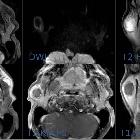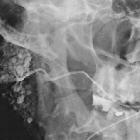benign lymphoepithelial lesions
Benign lymphoepithelial lesions (BLL or BLEL), also misleadingly known as AIDS-related parotid cysts (ARPC), are mixed solid and cystic lesions that enlarge the parotid glands, and are usually associated with cervical lymph node enlargement, and nasopharyngeal lymphofollicular hyperplasia.
Terminology
Benign lymphoepithelial lesions refer specifically to a histopathological finding that is non-specific and seen in the context of lymphoepithelial sialadenitis (typical of Sjögren syndrome) and HIV-associated salivary gland disease . This article focuses on the findings in the latter condition.
Epidemiology
Despite their aforementioned alternative name, benign lymphoepithelial lesions are seen usually in HIV positive patients without AIDS, and are not an AIDS defining illness. It is relatively common in the HIV population, with 5% of patients eventually developing benign lymphoepithelial lesions.
Pathology
Thought to arise from dilatation of intraglandular ducts from obstruction due to lymphoid hypertrophy. They are bilateral in ~20% of cases.
Location
BLLs most commonly arise in the parotid gland, and are only rarely seen in the submandibular glands or sublingual glands.
Radiographic features
- well-circumscribed cystic spaces
- may demonstrate thin rim enhancement on postcontrast MRI
- ultrasound demonstrates these 'cystic' lesions to actually have multiple small septations, and commonly also small mural nodules (40%)
- a vascular pedicle may be seen entering the cystic region
Benign lymphoepithelial lesions are usually seen associated with other sites of lymphoid hyperplasia , including:
- prominent nasopharyngeal adenoidal tissue: seen in 35% of HIV positive patients
- posterior triangle lymphadenopathy
- abnormal bone marrow signal
Differential diagnosis
On imaging consider
- first branchial cleft cyst
- Warthin tumor
- Sjogren syndrome
- sialocele
- sarcoidosis
- necrotic intraparotid lymph nodes
See also
Siehe auch:
- Sarkoidose
- Warthin-Tumor
- Sialadenitis
- Sjögren-Syndrom
- lymphoepitheliale Zyste der Glandula parotis
- Vergrößerung der Glandula parotis
- lymphoepitheliale Zyste des Pankreas
- salivary
und weiter:

 Assoziationen und Differentialdiagnosen zu benigne lymphoepitheliale Läsionen:
Assoziationen und Differentialdiagnosen zu benigne lymphoepitheliale Läsionen:





